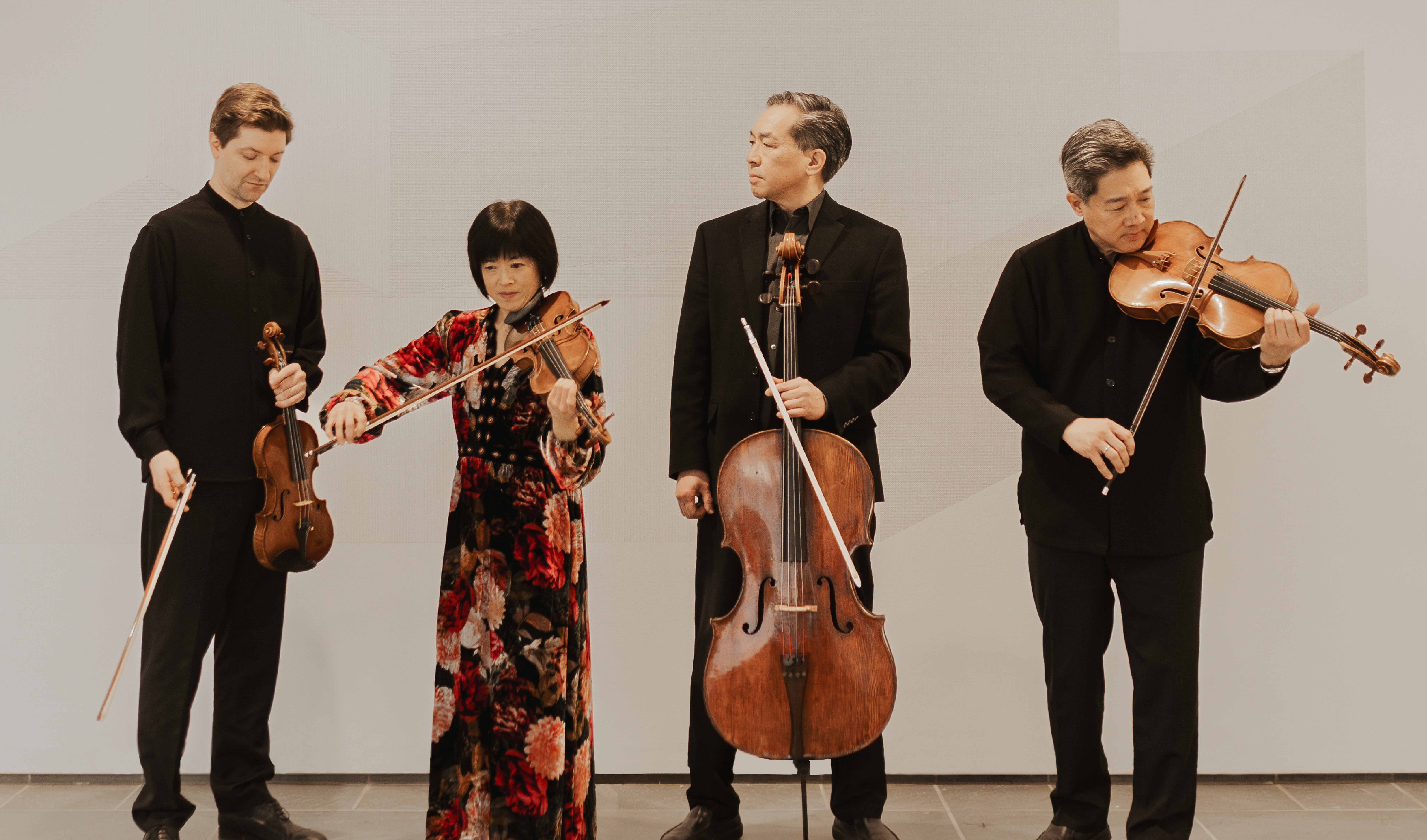- This event has passed.
Ying Quartet With Derek Bermel
This concert is sold out. Please email Lori Hopkinson if you would like to be placed on a waiting list.
Ying Quartet
Robin Scott, Janet Ying, violin • Phillip Ying, viola • David Ying, cello
FRANZ SCHUBERT
String Quartet No. 12 in C Minor, D. 703, “Quartettsatz”
DEREK BERMEL
A Short History of the Universe
Derek Bermel, clarinet
FRANZ SCHUBERT
String Quartet No. 14 in D Minor, D. 810, “Death and the Maiden”
Program Notes
FRANZ SCHUBERT
String Quartet No. 12 in C Minor, D. 703, “Quartettsatz” (1820)
Biographers tend to classify Schubert’s Quartettsatz as the first among the composer’s ‘late’ (or ‘mature’) chamber music works — but ‘lateness’ is relative, and Schubert was not quite 24 years old when he embarked on this composition. It is clear, in any case, that this movement is a far cry from the quartets of Schubert’s adolescence, many of which were composed for performance with his father and siblings. The far greater technical demands of the Quartettsatz, in contrast, lean toward the chamber music of his final years, including the famed “Rosamunde” and “Death and the Maiden” quartets.
It also seems clear that Schubert had initially set out to compose an entire quartet, not a standalone movement. The best evidence for this was discovered by Johannes Brahms, who was not only an early and enthusiastic devotee of Schubert’s work, but who also undertook the first critical edition of Schubert’s complete œuvre. Brahms obtained the Quartettsatz manuscript and saw to its publication in 1870, half a century after it was composed; in that manuscript, he also found forty-one measures of an abandoned Andante movement, following on from the completed Allegro. Composers and scholars like Brian Newbould and Livingston Gearhart have attempted speculative completions of this tantalizing musical fragment.
It is difficult to contemplate the Quartettsatz without thinking of Beethoven, whose specter must have weighed on Schubert’s mind as he undertook to compose for a genre (and in a key signature) upon which Beethoven had, even by 1820, made his lasting mark. The tremulous gesture which opens — and closes — the movement establishes a feverish frame, weaving into, and back out of, sunnier secondary and closing themes and providing the movement a haunting symmetry without closure.
Program Note by Peter Asimov
DEREK BERMEL
A Short History of the Universe (2013)
Derek Bermel has provided the following note to accompany A Short History of the Universe:
During my tenure at the Institute for Advanced Study in Princeton, I have attended several lectures on the subject of space-time, gravity, and the multiverse by the renowned theoretical physicist Nima Arkani-Hamed. Nima’s talks — always expansive, extroverted, and inspiring — describe phenomena at both tiny and enormous ends of the cosmic scale. His depictions (and diagrams) of gravity are exciting and dynamic, and I wondered how they might be expressed in musical terms. As I had been discussing with the phenomenal JACK quartet the possibility of writing a clarinet quintet for them + me, it seemed like the perfect opportunity. Inspired by Nima’s powerful sense of cosmological narrative, “A Short History of the Universe” presents musical depictions of our constant companion gravity, expressed both horizontally (in time, i.e. duration/speed) and vertically (in space, i.e. pitch/contour). Glissandi on the clarinet and in the strings spring away from and bounce back to the original notes. By exploring various ways of stretching and compacting, or “curving” musical spacetime, I hope to evince a sort of general relativity for the ears.
FRANZ SCHUBERT
String Quartet No. 14 in D Minor, D. 810, “Death and the Maiden” (1824)
In 1817, Franz Schubert completed a vocal setting of a grim text by German poet Matthias Claudius. In the song, “Der Tod und das Mädchen” or “Death and the Maiden,” the singer inhabits two voices. First, in a quick tempo, a young woman desperately begs death to spare her. Then death speaks, intoning along to a keyboard chorale that starts off stern but gradually becomes sweeter, promising the peace of eternal rest.
Schubert’s health deteriorated in 1823, as he started suffering early symptoms of the disease he would ultimately succumb to in 1828. The time he spent ailing and in the hospital was one of the things that spurred him to change compositional priorities and shift from writing songs and shorter pieces to creating larger-scale instrumental works. He produced several landmark chamber pieces in early 1824, including a turbulent String Quartet in D minor, for which he recruited the funereal chorale from “Der Tod und das Mädchen” as the subject of the theme-and-variation slow movement.
Many have attributed the drama of the so-called “Death and the Maiden” quartet to Schubert’s illness and dark frame of mind the previous year. Such correspondences must be asserted cautiously; he wrote some remarkably cheery pieces, like his Octet, around the same time. Still, the urgent triplets of the quartet’s opening and closing movements, the surging syncopations of the Scherzo, and the severity of the variation set all imply a sense of fury and foreboding. As with the theme borrowed from “Der Tod und das Mädchen,” the skipping, tarantella-style Finale features many phrases that start in a minor key and end in major. Is this trajectory a sign of overcoming adversity, or of resignation to the bliss of death? In the end, Schubert artfully evades giving a final answer to the question of the significance of the major key: he opts for a shocking eleventh-hour turn back to D minor in the last few measures of the quartet, bringing the piece to a close with a frantic, breathless struggle.
Program Note by Nicky Swett


